Unit 1 What's the matter
人教版初二(下)英语unit1 what's the matter知识点讲解与练习

八年级下册英语Unit 1 what’s the matter?词汇篇学生通过本讲学习,能够掌握本单元的重点词汇句型,并在综合能力上有一定的拓展。
1.matter的用法(1)名词:事情,问题What’s the matter? =what’s wrong (with you)? =what’s the trouble怎么啦?出什么事啦?(2)动词:有重大影响,有重要性如:What does it matter?2.疾病的表达法have a cold/a fever/ a toothache/ a stomachache3.take 的固定搭配take one’s temperature/ take breaks/ take risks/take some medicine/take off/ take care of/take away 4.surprise的用法1.做名词:to one’s surprise 使。
惊讶的,出乎。
意料2.做动词:surprise sb使某人吃惊3.做形容词:surprising, surprised的用法5.get的用法get off下车/get on上车/get into陷入,参与6.be used to sth/doing sth 习惯于做某事be used to do sth 被用作去做某事used to do sth 习惯于做某事7.out of的固定搭配look out of 向。
外看/ get out of从。
出来/ run out of用光基础演练1.---What’s wrong ______you?---I fell off the bike and hurt my leg.A. ofB. withC. forD. by2.Tom and Jenny enjoyed _________playing computer games.A. himselfB. herselfC. ourselvesD. themselves3. Sally became interested ___________science and wanted to be a scientist.A. forB. inC. throughD. at4. ---I had a __________.---You’d better go to see a dentist.A. headacheB. feverC. coldD. toothache5. I didn’t _________my temperature, but I knew I had a fever.A. giveB. setC. takeD. show二、根据汉语意思翻译句子。
Unit1-what's-the-matter-教材语法解析
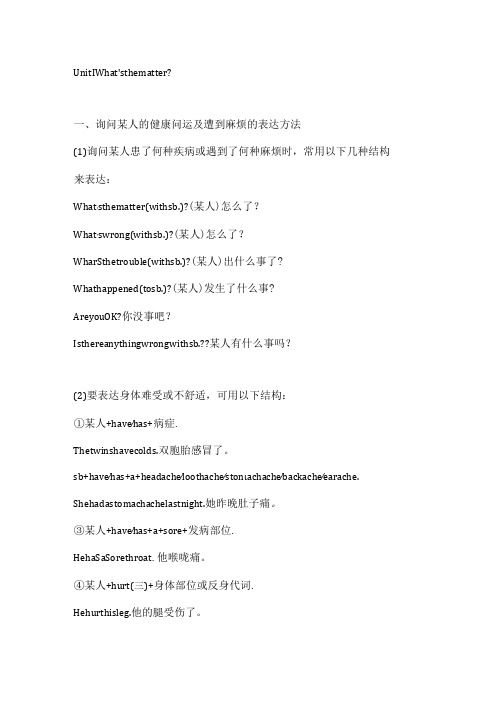
UnitIWhat'sthematter?一、询问某人的健康问运及遭到麻烦的表达方法(1)询问某人患了何种疾病或遇到了何种麻烦时,常用以下几种结构来表达:What,sthematter(withsb.)?(某人)怎么了?What,swrong(withsb.)?(某人)怎么了?WharSthetrouble(withsb.)?(某人)出什么事了?Whathappened(tosb.)?(某人)发生了什么事?AreyouOK?你没事吧?Isthereanythingwrongwithsb.??某人有什么事吗?(2)要表达身体难受或不舒适,可用以下结构:①某人+have∕has+病症.Thetwinshavecolds.双胞胎感冒了。
sb+have∕has+a+headache∕loothache∕stonιachache∕backache∕earache. Shehadastomachachelastnight.她昨晚肚子痛。
③某人+have∕has+a+sore+发病部位.HehaSaSorethroat.他喉咙痛。
④某人+hurt(三)+身体部位或反身代词.Hehurthisleg.他的腿受伤了。
⑤某部位+hurl(三).Myheadhurtsbadly.我头痛得厉害。
⑥某人+have∕has+apain+inone's+身体部位Ihaveapaininmychest.我胸口痛⑦(Thereis)soιnethingwrongwithone's+身体部位. Thereissomethingwrongwithmyrighteye.我的右眼有毛病。
⑧其他表达方式Shehasahearttrouble.她有心脏病。
Hegothitonthehead他头部受到了撞击。
Shecutherfinger.她割破手指了。
二、情态动词should的用法1.ShOIIld为情态动词,意为“应当:应当”,否定式为ShoUkIn'1,其后接动词原形,无人称和数的改变。
【中考考纲词汇详解】Unit1 What’s the matter

n.
情况,状况
真题例句
The situation became worse and worse.
情况变得越来越坏。
['kiːləʊ]
n.
千克;公斤
词形变化
kilogram千克
经典例句
Her weight has increased to 70 kilos.
她的体重增加到了70公斤。
['mætə(r)]
n.
事情,物质
常考词组
no matter无论
as a matter of fact事实上
经典例句
It doesn’t matter.没关系
[bæk]
n.
adv.
adj.
后部,背
向后
后面的
常考词组
at the back of在…的后面
come back回来
经典例句
There used to be a big and beautiful garden at the back of their house.
真题例句
My face hurt while I was walking down the street just now.
刚才当我沿着街走时,我的脸受伤了。
[hɪt]
v.
击,打
词形变化
过去式.过去分词:hit
真题例句
It is reported that a terrible rainstorm hit the south of our country last night.你看来累了。你需要 Nhomakorabea好休息一下。
[kɒf]
v.& n .
现行人教版英语8下Unit 1 What's the matter?重点知识讲解
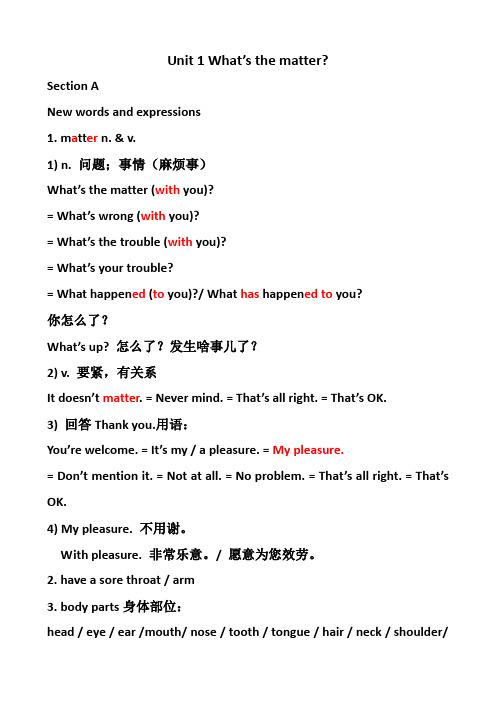
Unit 1 What’s the matter?Section ANew words and expressions1. m a tt er n. & v.1) n. 问题;事情(麻烦事)What’s the matter (with you)?= What’s wrong (with you)?= What’s the trouble (with you)?= What’s your trouble?= What happen ed (to you)?/ What has happen ed to you?你怎么了?What’s up? 怎么了?发生啥事儿了?2) v. 要紧,有关系It doesn’t matter. = Never mind. = That’s all right. = That’s OK.3) 回答Thank you.用语:You’re welcome. = It’s my / a pleasure. = My pleasure.= Don’t mention it. = Not at all. = No problem. = That’s all right. = That’s OK.4) My pleasure. 不用谢。
With pleasure. 非常乐意。
/ 愿意为您效劳。
2. have a sore throat / arm3. body parts身体部位:head / eye / ear /mouth/ nose / tooth / tongue / hair / neck / shoulder/arm / hand / finger / nail / leg / knee / foot / toe / wrist / a ncle(脚踝)/elbow(手肘,胳膊肘)angle Cn. 角tri angle 三角形angel Cn. 天使4. Sb. have a headache. = Sb.’s head aches / hurts.= Sb. have a pain in the head.= Sb.’s head is painful. 某人头疼。
Unit1-what's-the-matter-教材语法解析
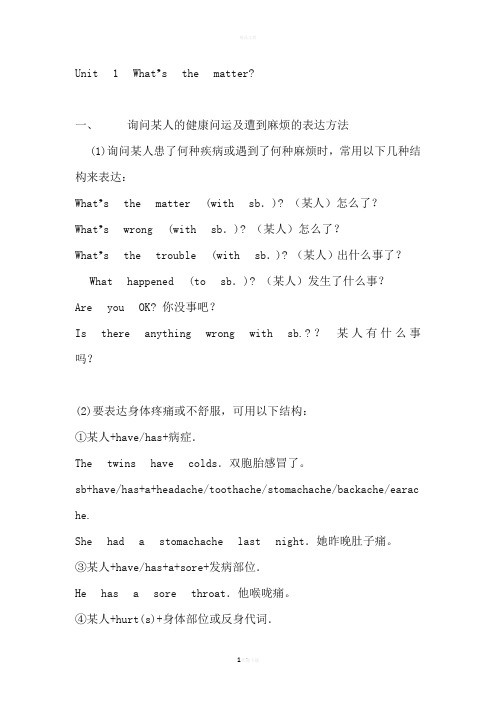
Unit1What’s the matter?一、询问某人的健康问运及遭到麻烦的表达方法(1)询问某人患了何种疾病或遇到了何种麻烦时,常用以下几种结构来表达:What’s the matter(with sb.)? (某人)怎么了?What’s wrong(with sb.)? (某人)怎么了?What’s the trouble(with sb.)? (某人)出什么事了?What happened(to sb.)? (某人)发生了什么事?Are you OK? 你没事吧?Is there anything wrong with sb.??某人有什么事吗?(2)要表达身体疼痛或不舒服,可用以下结构:①某人+have/has+病症.The twins have colds.双胞胎感冒了。
sb+have/has+a+headache/toothache/stomachache/backache/earac he.She had a stomachache last night.她昨晚肚子痛。
③某人+have/has+a+sore+发病部位.He has a sore throat.他喉咙痛。
④某人+hurt(s)+身体部位或反身代词.He hurt his leg.他的腿受伤了。
⑤某部位+hurt(s).My head hurts badly.我头痛得厉害。
⑥某人+have/has +a pain +in one’s+身体部位I have a pain in my chest.我胸口痛⑦(There is)something wrong with one’s+身体部位.There is something wrong with my right eye.我的右眼有毛病。
⑧其他表达方式She has a heart trouble.她有心脏病。
He got hit on the head他头部受到了撞击。
Unit1 What’s the matter
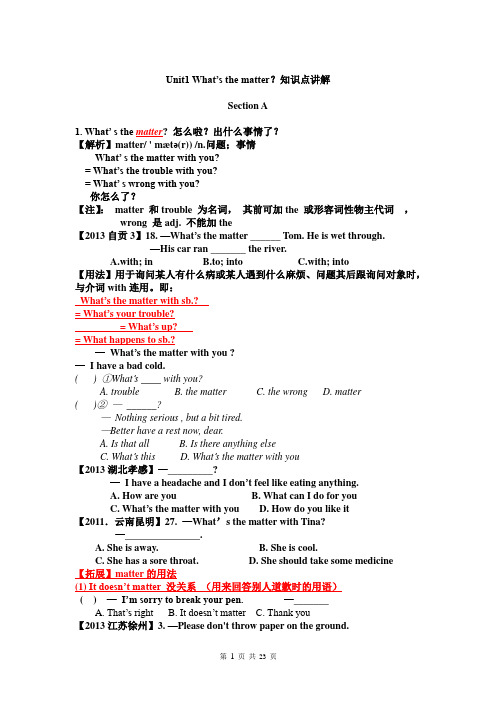
Unit1 What’s the matter?知识点讲解Section A1. What’ s the matter? 怎么啦?出什么事情了?【解析】matter/ ' mætə(r)) /n.问题;事情What’ s the matter with you?= What’s the trouble with you?= What’ s wrong with you?你怎么了?【注】:matter 和trouble 为名词,其前可加the 或形容词性物主代词,wrong 是adj. 不能加the【2013自贡3】18. —What’s the matter ______ Tom. He is wet through.—His car ran _______ the river.A.with; inB.to; intoC.with; into【用法】用于询问某人有什么病或某人遇到什么麻烦、问题其后跟询问对象时,与介词with连用。
即:What’s the matter with sb.?= What’s your trouble?= What’s up?= What happens to sb.?—What’s the matter with you ?—I have a bad cold.( ) ①What’s ____ with you?A. troubleB. the matterC. the wrongD. matter( )②—______?—Nothing serious , but a bit tired.—Better have a rest now, dear.A. Is that allB. Is there anything elseC. What’s thisD. What’s the matter with you【2013湖北孝感】—_________?—I have a headache and I don’t feel like eating anything.A. How are youB. What can I do for youC. What’s the matter with youD. How do you like it【2011.云南昆明】27. —What’s the matter with Tina?—_______________.A. She is away.B. She is cool.C. She has a sore throat.D. She should take some medicine【拓展】matter的用法(1) It doesn’t matter 没关系(用来回答别人道歉时的用语)( ) —I’m sorry to break your pen. —_______A. That’s rightB.It doesn’t matterC. Thank you【2013江苏徐州】3. —Please don't throw paper on the ground.—________,I won't.A. Excuse meB. That's all rightC. SorryD. It doesn't matter【2013黑龙江齐齐哈尔】17.-I have a pain in my back.-_____ . You’d better see a d octor.A. I’m sorry to hear thatB. Nothing seriousC. It doesn’t matter【2013湖北武汉】39. —I’m very sorry. I broke your tea cup.—__________.A. It doesn’t matterB. You’d better notC. Take it easyD. It’s too bad【2013四川广安】26.—Sorry, I'm late again.—______.A.That’s OK B.It doesn't matter C.Good idea (2) as a matter of fact= in fact 事实上, 实际上2. I have a cold 我感冒了I have a stomachache 我患胃痛I have a sore back. 我背痛。
Unit 1 What’s the matter_主要知识点整理
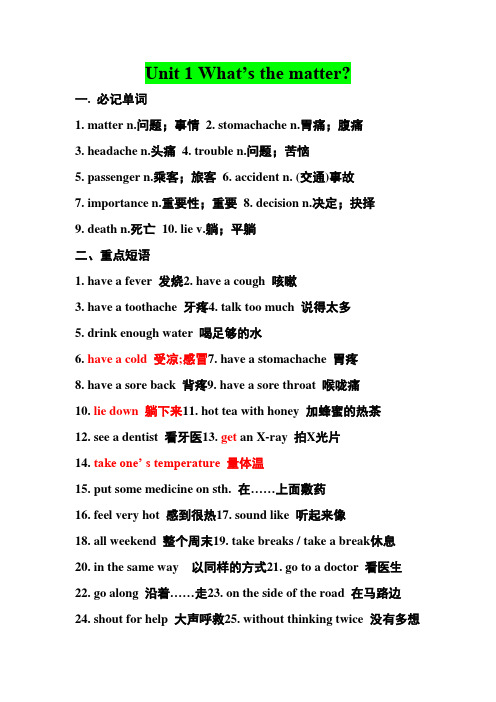
Unit 1 What’s the matter?一. 必记单词1. matter n.问题;事情2. stomachache n.胃痛;腹痛3. headache n.头痛4. trouble n.问题;苦恼5. passenger n.乘客;旅客6. accident n. (交通)事故7. importance n.重要性;重要8. decision n.决定;抉择9. death n.死亡10. lie v.躺;平躺二、重点短语1. have a fever 发烧2. have a cough 咳嗽3. have a toothache 牙疼4. talk too much 说得太多5. drink enough water 喝足够的水6. have a cold 受凉;感冒7. have a stomachache 胃疼8. have a sore back 背疼9. have a sore throat 喉咙痛10. lie down躺下来11. hot tea with honey 加蜂蜜的热茶12. see a dentist 看牙医13. get an X-ray 拍X光片14.take one’ s temperature 量体温15. put some medicine on sth. 在……上面敷药16. feel very hot 感到很热17. sound like 听起来像18. all weekend 整个周末19. take breaks / take a break休息20.in the same way 以同样的方式21. go to a doctor 看医生22. go along 沿着……走23. on the side of the road 在马路边24. shout for help 大声呼救25. without thinking twice 没有多想26. get off 下车27. have a heart problem 有心脏病28. to one’ s surprise 使.......惊讶的29. thanks to 多亏了;由于30. in time 及时31. think about doing 考虑做某事32. save a life 挽救生命33. get into trouble 造成麻烦34. right away 立刻;马上35. because of 由于36. do the right thing做正确的事37. get out of 离开;从……出来38. hurt oneself 受伤39. get hit / sunburned 被打击/晒伤40. put a bandage on sth. 用绷带包扎41. fall down 摔倒42. feel sick 感到恶心43. have a nosebleed 流鼻血44. cut his knee 割伤他的膝盖45. put her head back 把她的头向后仰46. have problem s breathing 呼吸困难47. go mountain climbing 去爬山48. be used to doing sth. 习惯做某事49. run out (of) 用完;用尽50. so that 以便51. so. . . that 如此… …以致于…52. be in control of 掌管;管理53.in a difficult situation 在困境中54. keep on doing sth. 继续或坚持做某事55. make decisions / make a decision 做出决定56. take risks / take a risk冒险57. give up doing 放弃做某事58. agree to do sth. 同意做某事59. cut off 切除60. lose one’s life 失去生命三.经典句型1. What’ s the matter with you?= What’s the trouble with you?= What’ s wrong with you?你怎么了?2. What should she do? 她该怎么办呢?Should I take my temperature? 我应该量一下体温吗?主语+ should/shouldn’t + 动词原形. ..①You should lie down and rest. 你应该躺下休息一会儿。
Unit1 What's the matter 短语总结-背诵版

Unit1What's the matter?短语总结—背诵版一、短语总结1.“(某人)怎么了?”表达(3+2+1+1)1.What’s the matter/trouble/problems(with sb.)?2.What’s wrong/up(with sb.)?3.(Is there)anything wrong(with sb.)?4.What happened to sb.?2.happen(意外地)发生(happen-happened-happened)1.take place(有计划地)发生2.take one’s place=take the place of sb.取代/代替某人的位置3.sth.happen(ed)to sb.某事发生在某人身上4.sb.happen(ed)to do sth.某人碰巧做某事3.“身体部位疼痛or不舒服”的表达(4)1.have a+疾病名词(headache/stomachache/toothache/其他疾病)2.have a sore+身体部位3.身体部位+hurt(s)4.have a pain in the+身体部位4.accident1.accidental adj.意外的accidentally adv.意外地2.by accident=accidentally意外地3.by mistake错误地5.lie1.lie in位于......(内部)2.lie to位于......(相隔海/省)3.lie on位于......(接壤)4.Iie ylie躺;位于lie-lay-lain lying lie down躺下lie on/in/to位于撒谎lie-lied-lied lie to sb.对某人撒谎lie about sth.对某事撒谎lay放置;下蛋lay-laid-laid laying lay down放下6.上下车1.get on/off+a/the bus/plane/train/metro/subway2.get in/into/out of+a/the taxi/car/van7.think v.思考;认为(think-thought-thought)1.think about思考;考虑2.think over=think about carefully仔细考虑3.think of认为;想起What do you think of...?=How do you like...?你认为...怎么样?4.think twice再三考虑;谨慎考虑8.surprise n./v.(surprise-surprised-surprised)1.to one’s surprise令某人吃惊的是2.in surprise=surprisingly吃惊地3.be surprised at对......感到吃惊4.be excited about对......感到激动5.be interested in对......感兴趣9.trouble n.麻烦(不可数)1.have trouble/problems/difficulty(in)doing sth.做某事有麻烦/问题/困难2.get into trouble陷入麻烦3.be in trouble在麻烦中10.fall v./n.(秋天)(fall-fell-fallen)1.fall behind sb.落后某人catch up with sb.赶上某人2.fall in love with sb./sth.爱上...../与......相爱3.fall down掉下4.fall over摔跤5.fall down from...=fall off...从......掉下6.fall asleep睡着11.run v.跑/经营(run-ran-run)1.run after...追赶...2.run away逃跑3.sb.run out of sth.某人用光/耗尽某物4.sth.run out某物花光/耗光5.run a shop/company/restaurant经营一家商店/公司/餐馆e n./v.使用(use-used-used)1.be useful=be of use有用的2.be useless=be of no use没有用的3.be used to(doing)sth.习惯于(做)某事4.be used to do sth.被用来做某事ed to do sth.过去常常做某事13.help n./v.帮助(help-helped-helped)1.help(sb.)to do sth.帮助某人做某事2.help sb.with sth.在某方面帮助某人3.can’t help doing sth.情不自禁/忍不住做某事4.help oneself to sth.自便/自取......(随便吃/喝......)5.with one’s help=with the help of sth.在某人的帮助下6.ask sb.for help=turn to sb.向某人寻求帮助14.own adj.自己的v.拥有(own-owned-owned)owner n.拥有者1.sb.own sth.=sb.be the owner of sth.某人拥有某物2.on one’s own=by oneself=alone独自地3.one’s own+n.(单/复)某人自己的......15.mean v.意思是/打算(mean-meant-meant)adj.刻薄的;吝啬的meaning n.意思;意义meaningful adj.有意义的meaningless无意义的1.mean to do sth.打算做某事2.mean doing sth.意味着做某事16.mind v.介意/在意(mind-minded-minded)n.决心;心智;思想;头脑1.make up one’s mind(to do sth.)下定决心(做某事)2.change one’s mind改变某人的主意3.keep......in mind记住......4.lose one’s mind失去理智;发疯5.in one’s mind=in one’s opinion=in one’s view在某人看来6.mind sb./one’s doing sth.介意某人做某事7.Never mind.(用于安慰)没关系;别担心;不要紧17.cut v.切割/砍(cut-cut-cut)1.cut up=cut...into pieces切碎2.cut off切掉3.cut down砍倒4.cut...in half对半切开18.keep v.保持;继续(keep-kept-kept)1.keep doing sth.保持做某事2.keep sb.doing sth.让某人保持做某事3.keep on doing sth.=go on doing sth.继续做某事4.keep/stop sb.from doing sth.阻止某人做某事19.risk(risk-risked-risked)1.be at risk=be in danger有危险的/在危险中2.take a risk=take risks冒险3.take the risk of sth.=be at the risk of sth.冒着......的风险4.risk doing sth.冒险做某事20.expect v.期待(expect-expected-expected)1.expect(sb.)to do sth.期待(某人)做某事2.expect that从句期待+宾语从句21.sick adj.生病的(定语、表语)ill adj.生病的(只作表语)1.sick-sicker-sickest ill-worse-worst2.be sick of sth.厌烦某事3.be tired of sth.厌倦某事22.breath n.呼吸breathe v.呼吸(breathe-breathed-breathed)1.breathe fresh air呼吸新鲜空气2.hold one’s breath屏住呼吸3.take a deep breath深呼吸4.be out of breath上气不接下气23.ready adj.准备好的1.get/be ready to do sth.准备好做某事2.get/be ready for sth.为......做好准备24.其他短语1.be in control of sth.控制/掌管/管理某事2.take one’s temperature量某人的体温3.take the medicine吃药take pills吃药片4.the rest of sth./sb.剩下的某物/某人5.right away=right now=at once立刻;立即;马上6.get out of...从......出来/离开......。
- 1、下载文档前请自行甄别文档内容的完整性,平台不提供额外的编辑、内容补充、找答案等附加服务。
- 2、"仅部分预览"的文档,不可在线预览部分如存在完整性等问题,可反馈申请退款(可完整预览的文档不适用该条件!)。
- 3、如文档侵犯您的权益,请联系客服反馈,我们会尽快为您处理(人工客服工作时间:9:00-18:30)。
Unit 1 What’s the matter?一、询问某人的健康问运及遭到麻烦的表达方法(1)询问某人患了何种疾病或遇到了何种麻烦时,常用以下几种结构来表达:What’s the matter (with sb.)?(某人)怎么了?What’s wrong (with sb.)?(某人)怎么了?What’s the trouble (with sb.)?(某人)出什么事了?What happened (to sb.)?(某人)发生了什么事? Are you OK?你没事吧?Is there anything wrong with sb.?某人有什么事吗?(2)要表达身体疼痛或不舒服,可用以下结构:①某人+have/has+病症. The twins have colds.双胞胎感冒了。
某人+have/has+a+headache/toothache/stomachache/backache/earache.She had a stomachache last night.她昨晚肚子痛。
③某人+have/has+a+sore+发病部位. He has a sore throat.他喉咙痛。
④某人+hurt(s)+身体部位或反身代词. He hurt his leg.他的腿受伤了。
⑤某部位+hurt(s). My head hurts badly.我头痛得厉害。
⑥某人+have/has+a pain+in one’s+身体部位, I have a pain in my chest.我胸口痛。
⑦(There is)something wrong with one’s+身体部位.There is something wrong with my right eye..我的右眼有毛病。
⑧其他表达方式She has a heart trouble.她有心脏病。
He got hit on the head他头部受到了撞击。
She cut her finger.她割破手指了。
二情态动词should的用法1.Should为情态动词,意为“应该;应当”,否定式为shouldn’t,其后接动词原形,无人称和数的变化。
常用来表示征询意见、建议、劝告、要求或义务等。
You should drink hot water with honey.你应该喝加有蜂蜜的开水。
He should put his head back他应该把头后仰。
We should try our best to help him.我们应当尽力去帮助他。
You shouldn‘t watch TV.你不应该看电视。
2.Should用于主语为第一人称的疑问句,表示征询意见。
Should I put some medicine on it?我应当给它敷上药吗? Should we tell her about it?我们应该告诉她这件事吗?【拓展】在英语中,表示建议的说法有很多,而且都是中考考查的重点。
主要结构有:①Would you like (to do) sth.?你想要/愿意(做)某事吗?Would you like to play basketball with me?你想要和我一起打篮球吗?②Shall I/we do sth ?我/我们做……好吗?Shall we go to the zoo tomorrow?明天我们去动物园,好吗?③Why not do sth ?为什么不……呢? Why not join us?为什么不加入到我们当中来呢?④How/What about doing sth ?做某事怎么样? How about going swimming?去游泳怎么样?⑤Let’s do sth让我们做……吧。
Let’s go home.咱们回家吧。
⑥You’d better (not) do sth你最好(不)要做某事。
You’d better not go there alone.你最好不要一个人去那儿。
一、单项选择( )1. What’s wrong with you?---I have a _______.The doctor asked me not to eat anything today because I ate too much yesterday.A .toothache B. headache C. sore back D. stomachache( )2. Jack, please tell Tom to call me when he ______ back.eB. comesC. cameD. will come( )3. she is not strong enough ________ walking up mountains.A to go B going C go D went ( )4. You will be late for school _____ you do not get up early.A but B if C and D or ( )5. I walked past the park, I saw some old people ________ Chinese Taiji.A doB didC doingD are doing( )6. So many problems! I am tired.--- You should try to ________ them by yourself. You are not a child any longer. A get into B get off C get on D get over( )7.Our teacher often tell us ________ in the river.It is dangerous.A don’t swimB not swimC not to swimD not swimming( )8. You have to leave now_______ you can catch the early bus.A. so thatB. as soon asC. becauseD. although( )9.How is your grandma?--She’s fine. She used to __ TV at home after super. But now she is used to ___ out for a walk. A watch; go B watching; go C watching; going D watch; going( )10. Mr.More has more money than Mr. Littly . Bu t he doesn’t enjoy _________ .A. heB. himC. hisD. himself( )11. It’s very cold outside . You should __________ your coat when you go out .A. put upB.stay up C .put on D. go on( )12. Some people waste too much water.They don't believe that it can ________ some day.A.keep out B.run out C.be run out D.run out of( )13. ____________ the doctor , the most beautiful teacher Zhang Lili is out of danger .A. In front ofB.Thanks toC.As forD. Across from( )14 .You look too tired . You _________ rest and _________ work too hard .A. should ; shouldB. shouldn’t ; shouldn’t C .shouldn’t ; should D.shoul d ; shouldn’t( )15. We must __________ using plastic bags in order to protect our earth .A. give outB. give up C .give away D. give in情景交际从方框中选择适当的句子完成对话,使对话意思完整、连贯。
(有两项多余)A: Hello , Maria ! You don’t look well . 1.__________B: I have a headache.A: 2.____________ .Did you go to see a doctor ?serious .A: 3.________________ .B: For two days .A: 4._______________B: Well , I am worried about my lessons .A: Don’t worry . I will help you when you get well .B: Thank you very much . 5._______________A: That’s right . I hope you will be better soon .Unit 2 I'll help clean up the city parks动词不定式A. 作主语——为避免句子的头重脚轻,常用it作为形式主语,而真正的主语动词不定式后置。
常用句型:It +be+adj./n.+(for/of sb.) to do sth./It takes sb. some time to do sth.B. 作宾语——动词want, decide, hope, ask, agree, choose, learn, plan, need, teach, prepare…常接动词不定式作宾语。
C. 作(后置)定语——常用于“have/has+sth.+to do”或“enough+名+to do”“It’s time to do sth.”等结构中。
D. 作宾语补足语——tell, ask, want, invite, teach, like, call等可接带to的动词不定式作宾语补足语,构成tell/ask/want /call/invite sb. to do sth.结构。
